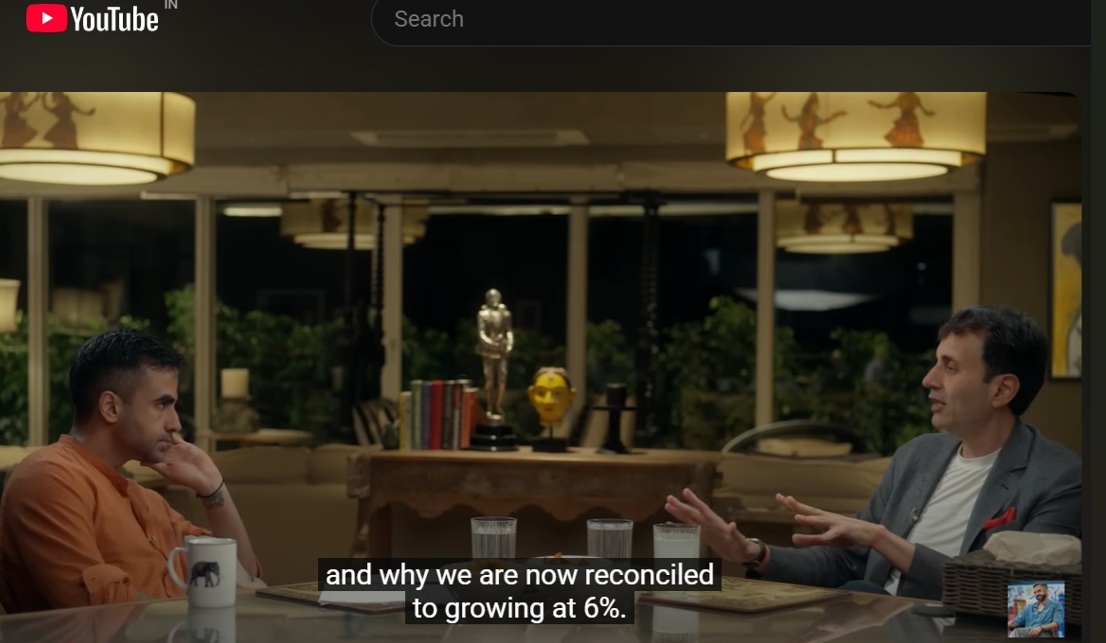“Bitcoin is here to stay. The overdependence on the US dollar has to end, and you need alternatives to emerge.”; Nikhil Kamath Hosts Ruchir Sharma on WTF is Finance? to Decode Global Economic Shifts, India’s Growth Story, and the AI Bubble

FinTech BizNews Service
Mumbai, September 6, 2025: In the opening episode of WTF is Finance, a new series focused on finance, investor and entrepreneur Nikhil Kamath sits down with global investor, author, and economic thought leader Ruchir Sharma for a wide-ranging conversation about the powerful forces shaping the world economy.

From tariffs and crypto to India’s growth paradox, America’s AI-driven markets, and China’s shifting fortunes, Ruchir Sharma candid, data-driven perspectives on where the next decade of wealth and disruption will emerge.
In this conversation, Ruchir unveils a few of his signature trends watch alongside sharp insights and unflinching truths on the global economy and geopolitics. A must-watch for anyone following global markets, India’s growth story, or the future of investing in an uncertain world. Key conversations include:
1. Ruchir Sharma’s Four Big Trends
AI’s Paradox: Ruchir sees America’s market riding almost entirely on AI, but warns the hype won’t translate evenly into profits. “The only reason for investing in the US today is AI. Otherwise, the rest of the world will do better than America.”
Europe’s Undervalued Potential: Ruchir opines that Europe could be the surprise story of the decade. “People have really, really given up on that continent, and expectations are very low. If there’s any place where leadership can emerge to challenge the US, that’s the only place.”
India’s Manufacturing Moment: Sharma argues India’s next wave of wealth will come from factories, not just services. “Services dominate GDP, but those who crack manufacturing create disproportionate wealth. The number one sector today is manufacturing, number two is possibly pharma.”

Shifting Global Currents: Sharma warned that politics, trade, and currencies are entering a volatile phase. He flagged two macro shifts: “The continent moving more right in Latin America,” and a slowdown in Southeast Asia. On currencies, he added, that the dollar is on a big declining path, while the rupee’s weakness has been “one of the very strange surprises of the year.”
2. Regulation Stifles Innovation:
On recent rules around real money gaming, Ruchir expresses mixed feelings. He shares, “Generally, I’m not in favor of regulation because 90% of the time it kills entrepreneurship and undermines the rise of new things. I think it’s been bad for the country. It fosters the black economy and undermines the spirit of mid- to small-sized businesspeople.”
3. FDI Growth Disappoints:
On the topic of FDI, Ruchir didn’t mince words, “As far as FDI is concerned, undoubtedly India’s rate has been a bit disappointing. He explains why, “It’s just a difficult country for a foreign investor to come and do business from the start. You’re almost happier doing a portfolio or other investment, piggybacking on the existing local person who knows how to navigate this environment.”
4. India’s Tax Paradox:
Nikhil asked whether measures like property tax or inheritance tax could genuinely drive social mobility, or if India is already taxing too much. Ruchir shares, “Our tax to GDP ratio is in fact high. We should be less focused on extracting more taxes from people. Complying with tax is still a big challenge.” He endorsed a simpler regime, suggesting, “Studies have shown that a flat tax tends to be the best way to raise more taxes.”
5. Tariffs vs. Free Trade:
Nikhil asked whether tariffs are truly beneficial or just reciprocal measures. Ruchir was clear: “Generally, from a pure economic perspective, tariffs aren’t great. It has helped many countries develop very rapidly because of the lack of tariffs.”
He pointed to East Asia as the model: “Free trade benefits countries the most.” On India’s path, his verdict is unequivocal: “Show me one country which has benefited from shutting itself off. I don’t know of any. The East Asian model was very much about ruthless competition, not protectionism.”

6. American Exceptionalism and the AI Market Bubble:
Nikhil noted that “American exceptionalism” was one of Ruchir’s big themes to watch, but wondered if it had really faded given U.S. market resilience. Ruchir countered that the shift is already visible: “After a long time, international stock markets are outperforming America. The U.S. market is up about 8–9% this year, but international markets, in dollar terms, are up 20%. So in that way, American exceptionalism has been dented.” But he warned the apparent strength is narrowly driven: “If it weren’t for the AI mania, I think the American stock market would be down.”
7. Private vs Public: Where’s the Bubble?:
Nikhil flags the debate on private vs public markets, noting his preference for private deals, and asks Ruchir for his take. Ruchir drew a sharp distinction: “In India, that may be true. But in the US, the entire bubble is now in the private markets, and it hasn’t been tested. In India, private markets are still in infancy, especially private credit. But in the US, I would not put any money in private markets today. If I had to be in the US, I’d be in the public markets.”
There’s one exception. “I’ll put money in America only to the extent that I believe in AI,” he admitted. “But otherwise, most of my capital is international today.”
8. AI, Productivity & the Bubble Question:
On AI, Nikhil notes that some warn soaring productivity could spark deflation, drive interest rates negative, and compel deficit nations to devalue their currencies.
Ruchir shares, “We are currently in the middle of an AI mania, where every problem in the world is being solved because of AI. I’m very concerned that this has echoes of what we went through in 1999-2000. The whole idea, the definition of a bubble, is a good idea gone too far, right?”
Ruchir further warns, “There’s a lot of AI hype today, and this bubble can get bigger, particularly when the Fed is cutting interest rates. But the whole idea that you can base policy already on AI, where governments think they can spend what they want, I don’t think we’re there yet. No government in the world, including the United States, has the money today to roll out universal basic income in any big way.”
9. Crypto Is Here to Stay:
With India taxing crypto heavily, Nikhil asked whether we are regulating ourselves out of a trillion-dollar opportunity. Ruchir was bullish on the sector’s long-term future. “I think that debate is over now, that crypto is here to stay. Bitcoin is here to stay. The overdependence on the US dollar has to end, and you need alternatives to emerge.”
10. Gold, Bitcoins:
On the future of stores of value, Nikhil contrasted gold with Bitcoin. “I try and make it a habit to keep between 8 to 10% of whatever I have in gold. It’s done very well of late.” Further, Nikhil asks, “Should there be a stable coin to solve for the remittances coming into India, one not denominated by the dollar but by another asset where India has more control over it?”
Ruchir viewed both gold and Bitcoin through the same lens. “I see both as anti-dollar plays,” he said. Ruchir cautions against losing sight of investing fundamentals. “I don’t think the basics, the 101 of wealth creation, will change. Equity valuation will always matter. You’ll keep getting these chunky returns, but so much depends on time horizon.”
11. Immigration Fuels America:
On matters regarding US visas, Nikhil raises a concern, highlighting that many young people in colleges are worried about what will happen to their visas a year from now. Ruchir said the anxiety reflects a much bigger structural issue. He explains that immigration has been central to America’s growth edge and says, “The really underappreciated part of America’s advantage was demographics. Because of immigration, America’s population growth rate was much faster than Europe and Japan.”
12. The New Bulls:
Southern & Eastern Europe and beyond: When asked about Ruchir’s portfolio, he says that his portfolio is increasingly tilted toward emerging markets and overlooked parts of Europe. “Spain, Greece, Portugal - they’re doing very well.” He highlights that Eastern Europe is even more exciting. “The next country to become a developed country likely is going to be Poland.” Ruchir is also looking east and south. “Countries like Vietnam are doing decently. And then I’m also turning much more optimistic on Latin America.”
13. Would Ruchir Bet on the U.S. Right Now?:
Nikhil asks Ruchir whether he would still bet on U.S. markets. Ruchir was clear: “Over the next 5-10 years, I think the rest of the world outperforms the U.S. Today, I’d say the only reason for being in the U.S. is AI. Everything else is either expensive or fundamentally flawed. Ruchir issues a warning, “A very key part of this is going to be that the dollar, I think, is going to be relatively weak for the next five to seven years.”
14. China’s Tech Edge: The Trump Card:
Turning to China, Nikhil steers the discussion toward its economy, manufacturing, real estate, social fabric, and overall public sentiment. Ruchir shares, “The key success to China's economic story was the fact that the government got out of the way. We all think of China as a state-directed model. It was quite the opposite.” Ruchir emphasizes that China still holds a technological trump card. “What is still sustaining China today is the fact that is its technological prowess. Even on the AI front, the only other country in the world today which can do AI of any meaningful scale is China.”
15. China’s Debt and Demographics Drag:
Nikhil pressed Ruchir on what he sees as China’s biggest vulnerabilities today. Ruchir was blunt: “Two big negatives stand out now in China: too much debt and demographics. China’s debt as a share of its economy is at the same level as America, even though America is a much richer economy.” The other drag, he says, China’s population today is shrinking, and with a shrinking population and too much debt, it is very difficult for a country to grow rapidly.”
Catch the full episode of 'People by WTF' featuring Ruchir Sharma on YouTube here: India vs. China vs. US: Who Wins the Next Decade? | WTF is Finance | Ep 1 ft. Ruchir Sharma
_________________________________________________________________________________________________
About the People by WTF podcast: People by WTF is a compelling series where Nikhil Kamath engages in candid, thought-provoking conversations with trailblazers from diverse industries across the globe. From business and technology to sports, entertainment, and policy, each episode offers rare insights into the minds of those redefining success. Through deep dives into pivotal moments, hard-earned lessons, and bold perspectives, People by WTF challenges conventional thinking and inspires audiences to push boundaries. This podcast is your gateway to transformative ideas, whether you're a business leader, entrepreneur, or someone eager to refine your skill set. Past guests include Indian Prime Minister Narendra Modi, Bill Gates, Nandan Nilekani, Ranbir Kapoor, and Kumar Mangalam Birla.